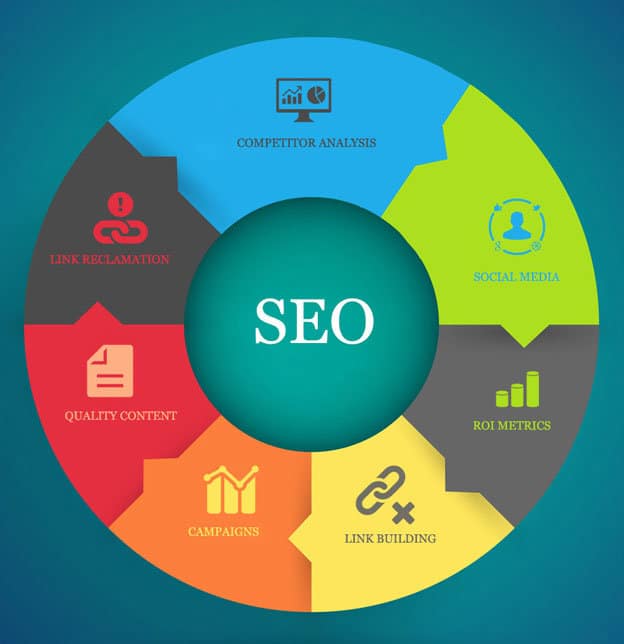Measuring the ROI of SEO Campaigns: What Metrics Matter Most?
Importance of measuring SEO campaign ROI
Measuring the return on investment (ROI) of your SEO campaigns is crucial for understanding the effectiveness of your efforts. By tracking key metrics, such as organic traffic, conversion rates, and keyword rankings, you can determine the impact of your SEO activities on your business's success. Understanding the importance of measuring SEO campaign ROI allows you to make data-driven decisions and allocate resources effectively to maximize the benefits of your SEO efforts.

Key metrics for evaluating SEO campaign success
When evaluating the success of your SEO campaign, it's essential to focus on specific metrics that will give you a clear understanding of its impact. Here are some key metrics that matter most:
- Organic Traffic: This refers to the number of visitors who land on your website through organic search results.
- Keyword Rankings: Keep track of how your targeted keywords are ranking on search engine results pages (SERPs) over time.
- Conversion Rate: Measure the percentage of website visitors who take the desired action, such as making a purchase or filling out a contact form.
- Bounce Rate: This metric indicates the percentage of visitors who leave your website after viewing only one page. A lower bounce rate is usually desirable.
- Backlink Profile: Analyze the quality and quantity of backlinks pointing to your website, as they play a crucial role in SEO success.
Focusing on these metrics will give you a comprehensive view of your SEO campaign's effectiveness.
Tracking website traffic and conversions
When evaluating the success of your SEO campaigns, it's important to track website traffic and conversions. By monitoring the number of visitors to your site and the rate at which they take desired actions, such as making a purchase or filling out a contact form, you can gauge the effectiveness of your SEO efforts. Utilizing tools such as Google Analytics can provide valuable insights into which keywords and strategies are driving the most significant results. Remember, the key metrics to focus on include:
- Organic traffic: The number of visitors coming to your site from search engine results.
- Bounce rate: The percentage of visitors who leave your site without interacting with it.
- Conversion rate: The percentage of visitors who complete a specific goal, such as making a purchase.
- Keyword rankings: The position of your website for relevant search terms.
- ROI: The return on investment from your SEO efforts, which can be calculated by comparing the cost of your SEO campaign with the revenue generated from increased traffic and conversions.
Analyzing keyword performance and search rankings
To measure the success of your SEO campaign, analyzing keyword performance and search rankings is crucial. These metrics help you understand which keywords are driving traffic to your website and how your website is ranking in search results. By tracking keyword performance, you can identify which keywords are bringing in the most traffic and which ones may need optimization. Similarly, monitoring search rankings allows you to see how your website is performing in search engine results pages, providing insights into the effectiveness of your SEO efforts.
Assessing backlink quality and quantity
Backlinks are crucial for your website's SEO. They are links from other websites that point to your site, which can help improve your search engine rankings. When evaluating the quality of backlinks, it's important to consider factors such as the authority of the linking website, the relevance of the link to your content, and the anchor text used for the link. Quantity is important, but quality is paramount. High-quality backlinks from authoritative and relevant websites will have a greater impact on your SEO efforts than a large number of low-quality backlinks. Be mindful of the type of websites linking to you, as these can significantly influence your website's search engine rankings.
Evaluating user engagement and behavior
To gauge user engagement and behavior for your SEO campaigns, it's essential to focus on specific metrics that reveal how users interact with your website. Some key metrics to consider include:
- Bounce Rate: This measures the percentage of visitors who navigate away from your site after viewing only one page. A high bounce rate can indicate that your website content may not be relevant or engaging for visitors.
- Pages Per Session: This metric tracks the average number of pages a visitor views during a single session on your website. A higher number of pages visited could indicate a more engaged audience.
- Average Session Duration: This metric reflects the average amount of time visitors spend on your site during a single session. A longer session duration typically indicates higher engagement and interest in your content.
- Conversion Rate: This measures the percentage of visitors who take a desired action on your website, such as making a purchase, signing up for a newsletter, or completing a form. A higher conversion rate often signals stronger user engagement and effective SEO strategies.
By regularly monitoring and analyzing these metrics, you can gain valuable insights into user behavior and engagement on your website, enabling you to make informed decisions to optimize your SEO campaigns.
Calculating cost per acquisition and return on investment
To determine the success of your SEO campaigns, it's crucial to calculate the cost per acquisition and return on investment. The cost per acquisition refers to the cost of acquiring a new customer through your SEO efforts, while the return on investment measures the profitability of your SEO campaigns. By analyzing these metrics, you can gain insights into the effectiveness of your SEO strategies and make informed decisions to maximize your marketing efforts.
Tools and platforms for measuring SEO metrics
When measuring the success of your SEO campaigns, it's important to use the right tools and platforms to track the relevant metrics effectively. Here are some popular tools and platforms for measuring SEO metrics:
- Google Analytics: This tool provides comprehensive data on website traffic, user behavior, and conversion rates, allowing you to track the success of your SEO efforts.
- Google Search Console: It offers insights into your website's performance in Google search results, including keyword rankings, click-through rates, and indexing issues.
- SEMrush: This platform provides competitive analysis, keyword research, backlink analysis, and site auditing features to help you monitor your SEO performance.
- Moz Pro: It offers various tools for keyword research, link building, and site audits, allowing you to track SEO metrics and improve your website's visibility.
Remember, utilizing the right tools and platforms can help you measure the impact of your SEO campaigns more effectively.
Interpreting data and making strategic adjustments
Making sense of the data from your SEO campaigns is crucial for making informed decisions. By analyzing metrics such as organic traffic, keyword rankings, conversion rates, and bounce rates, you can identify patterns and trends to guide your next steps. This data empowers you to pinpoint which aspects of your SEO strategy are working well and which need improvement. By interpreting this data, you can make strategic adjustments to optimize your ROI and achieve better results.
Maximizing the impact of SEO campaign ROI
To maximize the impact of your SEO campaign ROI, focus on these key metrics:
- Keyword Rankings: Track the keywords you are targeting and monitor their position in search engine results pages.
- Organic Traffic: Keep an eye on the amount of traffic coming to your website from organic search results.
- Conversion Rate: Measure the percentage of visitors who complete a desired action, such as making a purchase or filling out a form.
- Revenue from Organic Traffic: Calculate the revenue generated from visitors who came to your site through organic search.
- Cost Per Acquisition: Determine the cost of acquiring a customer through organic search efforts.
Focusing on these metrics will help you understand the effectiveness of your SEO efforts and make data-driven decisions to improve your campaign's ROI.



